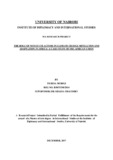| dc.description.abstract | Globally, climate change has emerged to be a fundamental issue that affects all nations. It has also become a phenomenon that requires global governance in the modern globalized world to tackle threats in the human societies. The African countries as well consider Climate change as a matter of concern even though their contribution towards the increase of Greenhouse Gases (GHGs) is minimal. Although, opportunities have been created for mitigation and adaptation; lack of financial, institutional and human capacities have constrained the implementation of these measures. Consequently, Africa encounters a major challenge of effectively participating in climate change negotiations due to her status within the international system coupled with the lack of capacities which are key for meaningful engagement. Notwithstanding the numerous internal difficulties faced by the African countries in climate negotiations and governance, improvement in response and willingness to cooperate and participate has been shown by the African countries as compared to the previous times. The governance of climate change attributes various doctrines which include; management and accountability as well as strengthening, all which are fundamental when dealing with the various threats posed by changing climate. Several governing mechanisms are also included, from informal cooperation between different institutions and actors to hierarchical forms of regulation. Therefore, climate change management can be described as a broad assortment of coordinating methods that propel mitigation as well as adaptation of climate change. This study intends to analyze the performance of Non-state actors in the mitigation and adaptation of climate change within Africa, using the African Union as a case study. The study objectives were: Establishing the major effects of change in climate, as well as the limitations undermining the mitigation and adaptation process, examining how different non-state actors assist states the mitigation and adaptation processes as well as highlighting the performance of the African Union in climate change mitigation and adaptation in Africa. The study adopted qualitative design in its conduct and utilized descriptive research designs. Descriptive research design is a scientific method which involves observing as well as describing the behavior of a subject by not changing it in any way. The researcher relied on both primary as well as secondary data. The Primary data was accessed by administering interviews to key persons. Secondary data was obtained from published data available from libraries including on-line libraries such as J-store. This comprised books, journals and newspaper articles. Internet sources also formed an important source of data in form of latest development in the field. The study finally recommends that the policy vacuum of climate change in Africa is large and calls for thoughtfulness alongside sound policies. The implications of any delay in this section are catastrophic and of dangerous precedence. Climate change adaptation and mitigation policies need to be harmonized by specific states together with natural resource management and legislations as well as development of institution capacity. | en_US |



